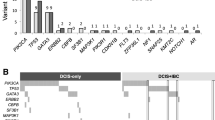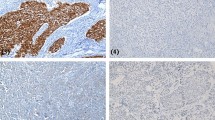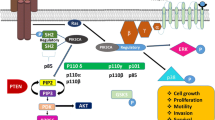Abstract
Mutationally activated protein kinases are appealing therapeutic targets in breast carcinoma. Mutations in phosphatidylinositol-3-kinase (PI3KCA) have been described in 8–40% of invasive breast carcinomas, and AKT1 mutations have been characterized in 1–8% of breast carcinomas. However, there is little data on these mutations in breast precursor lesions. To further delineate the molecular evolution of breast tumorigenesis, samples of invasive breast carcinoma with an accompanying in situ component were macro dissected from formalin-fixed paraffin embedded tissue and screened for mutations in PIK3CA exons 7, 9, 20, and AKT1 exon 2. Laser capture micro dissection (LCM) was performed on mutation-positive carcinomas to directly compare the genotypes of separated invasive and in situ tumor cells. Among 81 cases of invasive carcinoma, there were eight mutations in PIK3CA exon 20 (7 H1047R, 1 H1047L) and four mutations in exon 9 (2 E545K, 1 E542K, 1 E545G), totaling 12/81 (14.8%). In 11 cases examined, paired LCM in situ tumor showed the identical PIK3CA mutation in invasive and in situ carcinoma. Likewise, 3 of 78 (3.8%) invasive carcinomas showed an AKT1 E17K mutation, and this mutation was identified in matching in situ carcinoma in both informative cases. Mutational status did not correlate with clinical parameters including hormone receptor status, grade, and lymph node status. The complete concordance of PIK3CA and AKT1 mutations in matched samples of invasive and in situ tumor indicates that these mutations occur early in breast cancer development and has implications with regard to therapeutics targeted to the PI3 kinase pathway.


Similar content being viewed by others
References
Vogelstein B, Fearon ER, Hamilton SR, Kern SE, Preisinger AC, Leppert M et al (1988) Genetic alterations during colorectal-tumor development. N Engl J Med 319(9):525–532
Ma XJ, Salunga R, Tuggle JT, Gaudet J, Enright E, McQuary P et al (2003) Gene expression profiles of human breast cancer progression. Proc Natl Acad Sci USA 100(10):5974–5979. doi:10.1073/pnas.0931261100
Reis-Filho JS, Lakhani SR (2003) The diagnosis and management of pre-invasive breast disease: genetic alterations in pre-invasive lesions. Breast Cancer Res 5(6):313–319. doi:10.1186/bcr650
Burstein HJ, Polyak K, Wong JS, Lester SC, Kaelin CM (2004) Ductal carcinoma in situ of the breast. N Engl J Med 350(14):1430–1441. doi:10.1056/NEJMra031301
Simpson PT, Reis-Filho JS, Gale T, Lakhani SR (2005) Molecular evolution of breast cancer. J Pathol 205(2):248–254. doi:10.1002/path.1691
Samuels Y, Wang Z, Bardelli A, Silliman N, Ptak J, Szabo S et al (2004) High frequency of mutations of the PIK3CA gene in human cancers. Science 304(5670):554. doi:10.1126/science.1096502
Bachman KE, Argani P, Samuels Y, Silliman N, Ptak J, Szabo S et al (2004) The PIK3CA gene is mutated with high frequency in human breast cancers. Cancer Biol Ther 3(8):772–775
Hennessy BT, Smith DL, Ram PT, Lu Y, Mills GB (2005) Exploiting the PI3K/AKT pathway for cancer drug discovery. Nat Rev Drug Discov 4(12):988–1004. doi:10.1038/nrd1902
Wymann MP, Marone R (2005) Phosphoinositide 3-kinase in disease: timing, location, and scaffolding. Curr Opin Cell Biol 17(2):141–149. doi:10.1016/j.ceb.2005.02.011
Karakas B, Bachman KE, Park BH (2006) Mutation of the PIK3CA oncogene in human cancers. Br J Cancer 94(4):455–459. doi:10.1038/sj.bjc.6602970
Tokunaga E, Kimura Y, Mashino K, Oki E, Kataoka A, Ohno S et al (2006) Activation of PI3K/Akt signaling and hormone resistance in breast cancer. Breast Cancer 13(2):137–144. doi:10.2325/jbcs.13.137
Dillon RL, White DE, Muller WJ (2007) The phosphatidyl inositol-3-kinase signaling network: implications for human breast cancer. Oncogene 26:1338–1345. doi:10.1038/sj.onc.1210202
Samuels Y, Velculescu VE (2004) Oncogenic mutations of PIK3CA in human cancers. Cell Cycle 3(10):1221–1224
Altomare DA, Testa JR (2005) Perturbations of the AKT signaling pathway in human cancer. Oncogene 24(50):7455–7464. doi:10.1038/sj.onc.1209085
Saal LH, Holm K, Maurer M, Memeo L, Su T, Wang X et al (2005) PIK3CA mutations correlate with hormone receptors, node metastasis, and ERBB2, and are mutually exclusive with PTEN loss in human breast carcinoma. Cancer Res 65(7):2554–2559. doi:10.1158/0008-5472-CAN-04-3913
Perez-Tenorio G, Alkhori L, Olsson B, Waltersson MA, Nordenskjold B, Rutqvist LE et al (2007) PIK3CA mutations and PTEN loss correlate with similar prognostic factors and are not mutually exclusive in breast cancer. Clin Cancer Res 13(12):3577–3584. doi:10.1158/1078-0432.CCR-06-1609
Carpten JD, Faber AL, Horn C, Donoho GP, Briggs SL, Robbins CM et al (2007) A transforming mutation in the pleckstrin homology domain of AKT1 in cancer. Nature 448(7152):439–444. doi:10.1038/nature05933
Levine DA, Bogomolniy F, Yee CJ, Lash A, Barakat RR, Borgen PI et al (2005) Frequent mutation of the PIK3CA gene in ovarian and breast cancers. Clin Cancer Res 11(8):2875–2878. doi:10.1158/1078-0432.CCR-04-2142
Samuels Y, Ericson K (2006) Oncogenic PI3K and its role in cancer. Curr Opin Oncol 18:77–82. doi:10.1097/01.cco.0000198021.99347.b9
Campbell IG, Russell SE, Choong DY, Montgomery KG, Ciavarella ML, Hooi CS et al (2004) Mutation of the PIK3CA gene in ovarian and breast cancer. Cancer Res 64(21):7678–7681. doi:10.1158/0008-5472.CAN-04-2933
Lee JW, Soung YH, Kim SY, Lee HW, Park WS, Nam SW et al (2005) PIK3CA gene is frequently mutated in breast carcinomas and hepatocellular carcinomas. Oncogene 24(8):1477–1480. doi:10.1038/sj.onc.1208304
Wu G, Xing M, Mambo E, Huang X, Liu J, Guo Z et al (2005) Somatic mutation and gain of copy number of PIK3CA in human breast cancer. Breast Cancer Res 7(5):R609–R616. doi:10.1186/bcr1262
Buttitta F, Felicioni L, Barassi F, Martella C, Paolizzi D, Fresu G et al (2006) PIK3CA mutation and histological type in breast carcinoma: high frequency of mutations in lobular carcinoma. J Pathol 208(3):350–355. doi:10.1002/path.1908
Li SY, Rong M, Grieu F, Iacopetta B (2006) PIK3CA mutations in breast cancer are associated with poor outcome. Breast Cancer Res Treat 96(1):91–95. doi:10.1007/s10549-005-9048-0
Liang X, Lau QC, Salto-Tellez M, Putti TC, Loh M, Sukumar S (2006) Mutational hotspot in exon 20 of PIK3CA in breast cancer among Singapore Chinese. Cancer Biol Ther 5(5):544–548
Barbareschi M, Buttitta F, Felicioni L, Cotrupi S, Barassi F, Del Grammastro M et al (2007) Different prognostic roles of mutations in the helical and kinase domains of the PIK3CA gene in breast carcinomas. Clin Cancer Res 13(20):6064–6069. doi:10.1158/1078-0432.CCR-07-0266
Benvenuti S, Frattini M, Arena S, Zanon C, Cappelletti V, Coradini D et al (2008) PIK3CA cancer mutations display gender and tissue specificity patterns. Hum Mutat 29(2):284–288
Maruyama N, Miyoshi Y, Taguchi T, Tamaki Y, Monden M, Noguchi S (2007) Clinicopathologic analysis of breast cancers with PIK3CA mutations in Japanese women. Clin Cancer Res 13((2 Pt 1)):408–414. doi:10.1158/1078-0432.CCR-06-0267
Lai YL, Mau BL, Cheng WH, Chen HM, Chiu HH, Tzen CY (2008) PIK3CA Exon 20 Mutation is Independently Associated with a Poor Prognosis in Breast Cancer Patients. Ann Surg Oncol 15(4):1064–1069. doi:10.1245/s10434-007-9751-7
Liedtke C, Cardone L, Tordai A, Yan K, Gomez HL, Figureoa LJ et al (2008) PIK3CA-activating mutations and chemotherapy sensitivity in stage II-III breast cancer. Breast Cancer Res 10(2):R27. doi:10.1186/bcr1984
Stemke-Hale K, Gonzalez-Angulo AM, Lluch A, Neve RM, Kuo WL, Davies M et al (2008) An integrative genomic and proteomic analysis of PIK3CA, PTEN, and AKT mutations in breast cancer. Cancer Res 68(15):6084–6091. doi:10.1158/0008-5472.CAN-07-6854
Bleeker FE, Felicioni L, Buttitta F, Lamba S, Cardone L, Rodolfo M et al (2008) AKT1(E17K) in human solid tumours. Oncogene 27:5648–5650. doi:10.1038/onc.2008.170
Kim MS, Jeong EG, Yoo NJ, Lee SH (2008) Mutational analysis of oncogenic AKT E17K mutation in common solid cancers and acute leukaemias. Br J Cancer 98(9):1533–1535. doi:10.1038/sj.bjc.6604212
Pratilas CA, Hanrahan AJ, Halilovic E, Persaud Y, Soh J, Chitale D et al (2008) Genetic predictors of MEK dependence in non-small cell lung cancer. Cancer Res 68(22):9375–9383. doi:10.1158/0008-5472.CAN-08-2223
Wolff AC, Hammond ME, Schwartz JN, Hagerty KL, Allred DC, Cote RJ et al (2007) American Society of Clinical Oncology/College of American Pathologists Guideline Recommendations for Human Epidermal Growth Factor Receptor 2 Testing in Breast Cancer. Arch Pathol Lab Med 131(1):18–43
Lasota J, vel Dobosz A, Wasag B, Wozniak A, Kraszewska E, Michej W et al (2007) Presence of homozygous KIT exon 11 mutations is strongly associated with malignant clinical behavior in gastrointestinal stromal tumors. Lab Invest 87(10):1029–1041. doi:10.1038/labinvest.3700628
Salvesen H, Carter S, Mannelqvist M, Dutt A, Getz G, Stefansson I et al (2009) Integrated genomic profiling of endometrial carcinoma associates aggressive tumors with indicators of PI3 kinase activation. Proc Natl Acad Sci USA 106(12):4834–4839. doi:10.1073/pnas.0806514106
Ikenoue T, Kanai F, Hikiba Y, Obata T, Tanaka Y, Imamura J et al (2005) Functional analysis of PIK3CA gene mutations in human colorectal cancer. Cancer Res 65(11):4562–4567. doi:10.1158/0008-5472.CAN-04-4114
Isakoff SJ, Engelman JA, Irie HY, Luo J, Brachmann SM, Pearline RV et al (2005) Breast cancer-associated PIK3CA mutations are oncogenic in mammary epithelial cells. Cancer Res 65(23):10992–11000. doi:10.1158/0008-5472.CAN-05-2612
Vogt PK, Kang S, Elsliger MA, Gymnopoulos M (2007) Cancer-specific mutations in phosphatidylinositol 3-kinase. Trends Biochem Sci 32(7):342–349. doi:10.1016/j.tibs.2007.05.005
Zhang H, Liu G, Dziubinski M, Yang Z, Ethier SP, Wu G (2008) Comprehensive analysis of oncogenic effects of PIK3CA mutations in human mammary epithelial cells. Breast Cancer Res Treat 112(2):217–227. doi:10.1007/s10549-007-9847-6
Zhao L, Vogt PK (2008) Class I PI3K in oncogenic cellular transformation. Oncogene 27(41):5486–5496. doi:10.1038/onc.2008.244
Gymnopoulos M, Elsliger MA, Vogt PK (2007) Rare cancer-specific mutations in PIK3CA show gain of function. Proc Natl Acad Sci USA 104(13):5569–5574. doi:10.1073/pnas.0701005104
Oda K, Okada J, Timmerman L, Rodriguez-Viciana P, Stokoe D, Shoji K et al (2008) PIK3CA cooperates with other phosphatidylinositol 3’-kinase pathway mutations to effect oncogenic transformation. Cancer Res 68(19):8127–8136. doi:10.1158/0008-5472.CAN-08-0755
Hayes MP, Wang H, Espinal-Witter R, Douglas W, Solomon GJ, Baker SJ et al (2006) PIK3CA and PTEN mutations in uterine endometrioid carcinoma and complex atypical hyperplasia. Clin Cancer Res 12((20 Pt 1)):5932–5935. doi:10.1158/1078-0432.CCR-06-1375
Velasco A, Bussaglia E, Pallares J, Dolcet X, Llobet D, Encinas M et al (2006) PIK3CA gene mutations in endometrial carcinoma: correlation with PTEN and K-RAS alterations. Hum Pathol 37(11):1465–1472. doi:10.1016/j.humpath.2006.05.007
LoPiccolo J, Blumenthal GM, Bernstein WB, Dennis PA (2008) Targeting the PI3K/Akt/mTOR pathway: effective combinations and clinical considerations. Drug Resist Updat 11(1–2):32–50. doi:10.1016/j.drup.2007.11.003
Engelman JA, Chen L, Tan X, Crosby K, Guimaraes AR, Upadhyay R et al (2008) Effective use of PI3K and MEK inhibitors to treat mutant Kras G12D and PIK3CA H1047R murine lung cancers. Nat Med 14(12):1351–1356. doi:10.1038/nm.1890
Garcia-Echeverria C, Sellers WR (2008) Drug discovery approaches targeting the PI3K/Akt pathway in cancer. Oncogene 27(41):5511–5526. doi:10.1038/onc.2008.246
Crowder RJ, Ellis MJ (2005) Treating breast cancer through novel inhibitors of the phosphatidylinositol 3’-kinase pathway. Breast Cancer Res 7(5):212–214. doi:10.1186/bcr1307
Acknowledgments
The authors wish to acknowledge expert technical assistance of Carolyn Gendron, Rebecca Lewis, Judith Levine, Carol Beadling, and Andrea Warrick. Dr. Terry Morgan provided assistance with the statistical calculations. This work was supported in part by a VA Merit Review Grant from the Department of Veterans Affairs (MCH) and by a grant from the OHSU Medical Research Foundation.
Author information
Authors and Affiliations
Corresponding author
Rights and permissions
About this article
Cite this article
Dunlap, J., Le, C., Shukla, A. et al. Phosphatidylinositol-3-kinase and AKT1 mutations occur early in breast carcinoma. Breast Cancer Res Treat 120, 409–418 (2010). https://doi.org/10.1007/s10549-009-0406-1
Received:
Accepted:
Published:
Issue Date:
DOI: https://doi.org/10.1007/s10549-009-0406-1




